
A municipality is a local government unit (LGU) in the Philippines. It is distinct from city, which is a different category of local government unit. Provinces of the Philippines are divided into cities and municipalities, which in turn, are divided into barangays – villages. As of September 7, 2019, there are 1,488 municipalities across the country.

The Bangko Sentral ng Pilipinas is the central bank of the Philippines. It was established on July 3, 1993, pursuant to the provision of Republic Act 7653 or the New Central Bank Act of 1993 as amended by Republic Act 11211 or the New Central Bank Act of 2019. The principal author was Senator Franklin Drilon. It was signed by President Rodrigo Duterte.
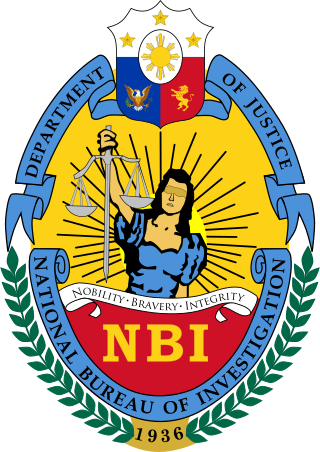
The National Bureau of Investigation is an agency of the Philippine government under the Department of Justice, responsible for handling and solving major high-profile cases that are in the interest of the nation.
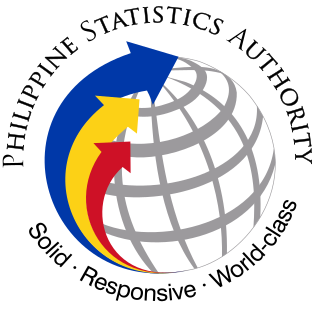
The Philippine Statistics Authority is the central statistical authority of the Philippine government that collects, compiles, analyzes and publishes statistical information on economic, social, demographic, political affairs and general affairs of the people of the Philippines and enforces the civil registration functions in the country.

The Philippines' Department of Social Welfare and Development is the executive department of the Philippine Government responsible for the protection of the social welfare of rights of Filipinos and to promote the social development.
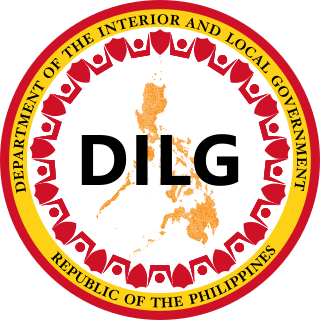
The Department of the Interior and Local Government, abbreviated as DILG, is the executive department of the Philippine government responsible for promoting peace and order, ensuring public safety and strengthening local government capability aimed towards the effective delivery of basic services to the citizenry.

The Department of Transportation is the executive department of the Philippine government responsible for the maintenance and expansion of viable, efficient, and dependable transportation systems as effective instruments for national recovery and economic progress. It is responsible for the country's land, air, and sea communications infrastructure.

The Department of Trade and Industry is the executive department of the Philippine government responsible for the advancement, promotion, governance, regulation, management and growth of industry and trade.
The Philippines' Presidential Management Staff is an agency attached to Malacañang that is tasked to manage the development and formulation of the projects and policies of the Office of the President. Though the PMS is headed by a Secretary, the Secretaries of the Cabinet, Chief of Staff, and Appointments, support the agency. The PMS, the Office of the Appointments Secretary and the newly created Events Management Cluster are under the supervision of the Office of the Special Assistant to the President.

The National Economic and Development Authority is an independent cabinet-level agency of the Philippine government responsible for economic development and planning. It is headed by the president of the Philippines as chairman of the NEDA board, with the Secretary of Socioeconomic Planning as vice-chairman. A number of Cabinet members, the Governor of the Bangko Sentral ng Pilipinas, the Chairperson of the Metropolitan Manila Development Authority, the Chief Minister of Bangsamoro, the Secretary of Information and Communications Technology, the Chairman of the Subic–Clark Area Development Corporation, and the National President of the Union of Local Authorities of the Philippines are members of the NEDA Board.

The Technical Education and Skills Development Authority serves as the Philippines' Technical Vocational Education and Training (TVET) authority. As a government agency, TESDA is tasked to both manage and supervise the Philippines' Technical Education and Skills Development (TESD). Its goals are to develop the Filipino workforce with "world-class competence and positive work values" and to provide quality technical-educational and skills development through its direction, policies, and programs.

The National Book Development Board, abbreviated as NBDB, is an agency of the Philippine government under the Department of Education formed through Republic Act No. 8047 or the Book Publishing Industry Development Act, which was responsible for promoting the continuing development of the book-publishing industry in the Philippines, with the active participation of the private sector. NBDB's operational plan are: grassroots capacity-building initiatives, investment and trade promotion activities, public campaigns and institutionalized research and data gathering.
The state of Michigan is largely divided in the same way as many other U.S. states, but is distinct in its usage of charter townships. Michigan ranks 13th among the fifty states in terms of the number of local governmental entities.
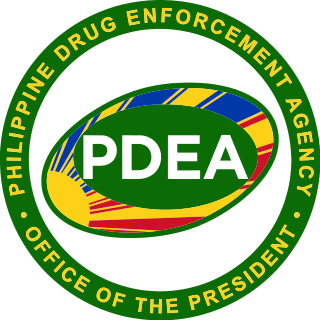
The Philippine Drug Enforcement Agency is the lead anti-drug law enforcement agency, responsible for preventing, investigating and combating any dangerous drugs, controlled precursors and essential chemicals within the Philippines. The agency is tasked with the enforcement of the penal and regulatory provisions of Republic Act No. 9165, otherwise known as the Comprehensive Dangerous Drugs Act of 2002.
The Government of Zamboanga City, also known as the Zamboanga City Government is the local government unit in-charge of the City of Zamboanga. It is a mayor-council form of government supervised directly by the President of the Philippines and the Secretary of the Interior and Local Government.

The Office of the Solicitor General of the Philippines, formerly known as the Bureau of Justice, is an independent and autonomous office attached to the Department of Justice. The OSG is headed by Menardo Guevarra.

The Office of the President of the Philippines, is an administrative, advisory, and consultative government agency that aids the president of the Philippines in performing their duty as head of state and chief of the executive branch of government.

First Isabela Cooperative Bank, commonly known as FICOBank, is a cooperative bank in the Philippines established in the mid-1970s. It is primarily engaged in financial intermediation between and among: the farmers, fishers and their organizations; the micro, small and medium entrepreneurs; the rural, urban and overseas workers; and the other groups of financial consumers. It also provides money-transfer/remittance, cash-dispensing, microinsurance and other fee-based services to the public. As of December 31, 2022, FICOBank has 40 branches located in the provinces of Isabela, Quirino, Nueva Vizcaya, Cagayan, Tarlac, Nueva Ecija, Bataan, Pampanga, Pangasinan, Bulacan and Kalinga.
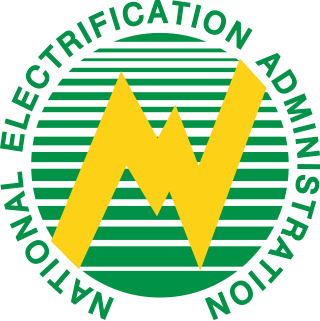
The National Electrification Administration is a government-owned and controlled corporation (GOCC) attached to the Department of Energy of the Philippines tasked in the full implementation of the rural electrification program (REP) and reinforce the technical capability and financial viability of the 121 rural electric cooperatives (ECs).

The National Irrigation Administration (NIA) (Filipino: Pambansang Pangasiwaan ng Patubig) is a Philippine government-owned and controlled corporation primarily responsible for irrigation development and management in the country.


















